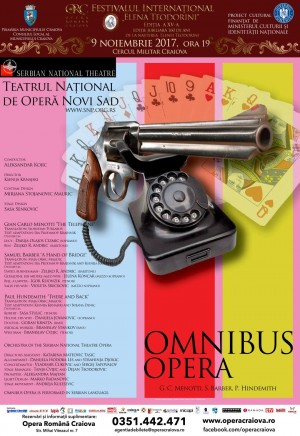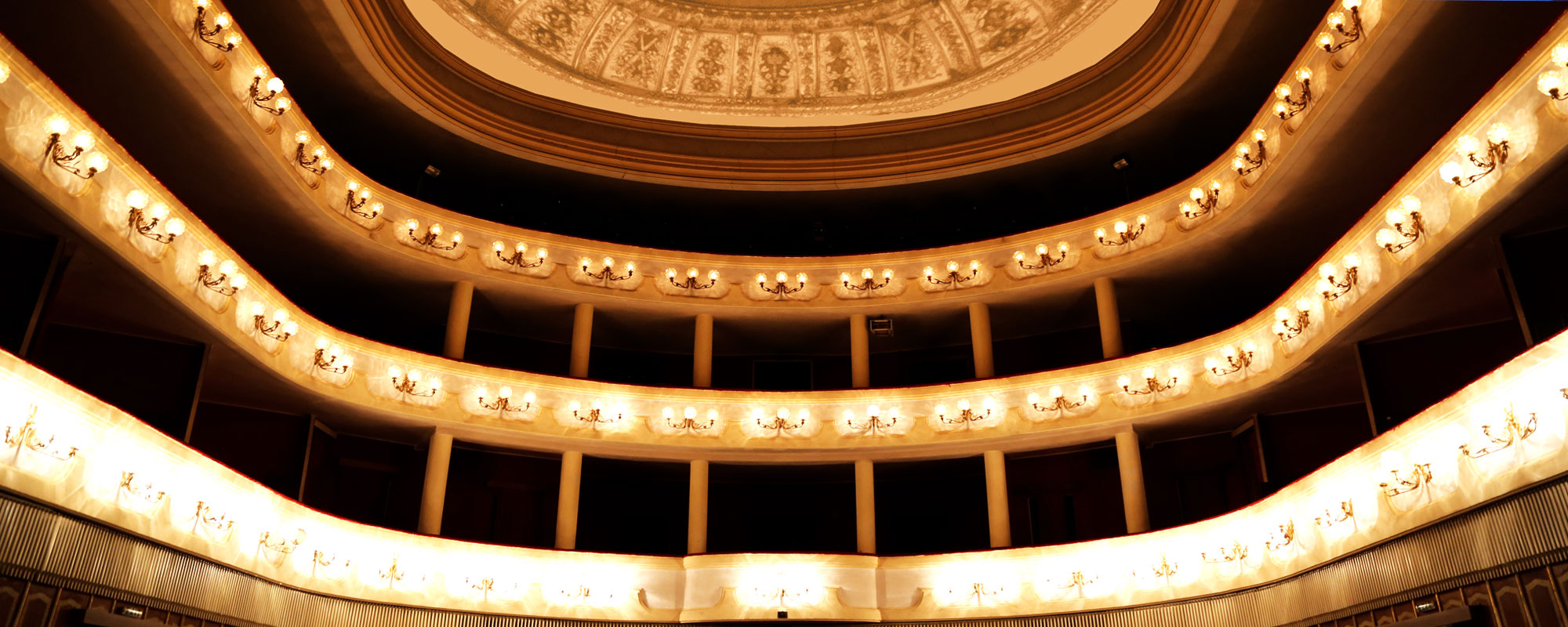Omnibus Opera
G.C. Menotti, S. Barber, P. Hundemith

Festivalul Internațional „Elena Teodorini” – ediția a XV-a
Spectacol susținut de Teatrul Național de Operă Novi Sad pe scena Cercului Militar Craiova
Omnibus Opera consists of three minut operas and these are:
Gian Carlo Menotti "The Telephone", Samuel Barber "A Hand of Bridge", and
Paul Hundemith: "There and Back".
Omnibus Opera is performed in Serbian language.
These three operas take approximately fifty (50) minutes, and thematically belong to the genre of opera buffo. Selection of these three operas and its topics are: first opera is criticizing excessive use of phone and thus being reason for a young man not succeeding in proposing his girlfriend; second is whimsy commenting usual marital problems, as a phenomenon of current society, presented in a comic way between two middle-aged couples while playing bridge; and third is a love intrigue in which occur jealous outburst and murder (adultery and punishment), but, at the same time, with manipulation of the flow of time.
We will emphasize the fact that these acts, though created in the first half of the twentieth century, are designed in moderate and modernist way so that they are suitable for carrying not only before professional but also attractive to a wider audience.
AUTHORS TEAM
Conductor: Aleksandar Kojic
Director: Ksenija Krnajski
Costume Design: Mirjana Stojanovic Mauric
Stage Design: Sasa Senkovic
Gian Carlo Menotti "The Telephone"
Translation: Slobodan Turlakov
Text adaptation: Ira Prodanov Krajisnik
Cast:
Lucy: Darija Olajos Cizmic (soprano)
Ben: Zeljko R. Andric (baritone)
Samuel Barber "A Hand of Bridge"
Translation: Maja Orsic Magdic
Text adaptation: Ira Prodanov Krajisnik and Ksenija Krnajski
Cast:
David, businessman: Zeljko R. Andric (baritone)
Geraldine, his middle-aged wife: Jelena Koncar (mezzo-soprano)
Bill, a lawyer: Igor Ksionzik (tenor)
Sally, his wife: Violeta Sreckovic (mezzo-soprano)
Paul Hundemith: "There and Back"
Translation: Maja Orsic Magdic
Text adaptation: Ksenija Krnajski and Bojana Denic
Cast:
Robert: Sasa Stulic (tenor)
Helene, his wife: Danijela Jovanovic (soprano)
Doctor: Goran Krneta (bass)
Medical worker: Branislav Stankov (bass)
Wise Man: Branislav Cvijic (tenor)
Orchestra of the Serbian National Theatre Opera
Director's Assistant: Katarina Mateovic Tasic
Accompanist: Danijela Hodoba Les and Strahinja Djokic
Concertmaster: Vladimir Cukovic and Sergej Sapovalov
Stage Manager: Tanja Cvijic and Dejan Teodorovic
Prompter: Aleksandra Majtan
Light Design: Marko Radanovic
Stage movement: Andreja Kulesevic
SYNOPSIS
The idea of opera lasting only for ten minutes appears to be almost unrealistic, thus becoming very intriguing and attractive.
The production emphasizes the fact that these acts, though created in the first half of the twentieth century, are designed in moderate and modernist way so that they are suitable for performance before not only professional audience, but also appealing to a wider, especially young audience. Music in question is sound wise moderately modernistic, therefore appealing to the contemporary audience, economical in duration, i.e. in line with the requirements of the “fast-paced” times we live in.
All these operas belong to the genre of buffas and they only last fifty (50) minutes.
The first one The Telephone criticizes the excessive use of cellphones, this being the reason why a young man does not succeed in proposing to his girlfriend. In despair, Ben leaves the apartment rushing off on a business trip. He concludes the marriage proposal to his girlfriend Lucy on the phone. She accepts and promises to become his wife.
The second opera The Hand of Bridge is a whimsy comment on the usual marital problems, as a phenomenon of current society. These conflicts are presented in a comic manner between two middle-aged couples while playing bridge. Unhappy with their private lives, their fantasies of love, jealousy, marital infidelity and bisexuality intertwine in a strange web.
The third piece There and Back presents us a love intrigue in which jealous outbursts and murder take place (as a punishment for adultery). The flow of time is manipulated; events take place at the speed of lightning, thus creating a parody of traditional themes of most popular classical operas – deceit, jealousy, murder and suicide.

